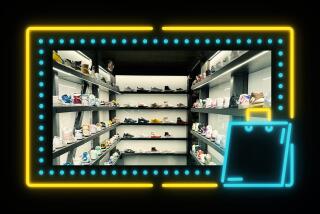Blu-Note Music Still Strikes a Chord in Santa Ana
When Howard Judkins looks at his music shop -- cluttered with dozens of instruments stored on shelves and countertops and stacked on the floor -- he sees that all is right with the world.
Music is as popular as ever, bridging cultures and uniting people. That is apparent in his Santa Ana store, where the instruments he repairs are as diverse as the community. Asian instruments such as the koto and bulky guitarrons favored by mariachis are repaired at the Blu-Note, along with instruments found in every high school band.
Children are still lured by the soothing sound of a stringed instrument, the staccato of percussion and the loud presence of brass horns, said Judkins, 75. Music classes are often the first to go in education cutbacks, but music itself always survives.
“Kids are as interested today in learning how to play a musical instrument as they were 50 years ago,” he said. “And instruments will always need to be repaired or tuned. That’s why the Blu-Note has been around all these years.”
Blu-Note Music has been a mainstay in downtown Santa Ana since 1933. Over the years the store has moved from block to block when leases expire, but Judkins cannot think of a business that has been downtown longer.
He has owned the store since 1963, and for 30 years, until his recent retirement, also taught a class in instrument repair at Orange Coast College.
The shop’s catchy name is often confused with the Blue Note record label, famous for its jazz artists. Judkins said he frequently gets telephone calls from people across the country looking for jazz records.
Located near Broadway and 3rd Street, the Blu-Note is tucked in a time warp of sorts. A sign inside tells customers that “Your BankAmericard Welcomed Here.” That was a bank card issued beginning more than 40 years ago and is no longer in use.
The customer area and back shop, where instruments are repaired, look as if they were plucked out of a movie set from the 1930s or ‘40s. The wooden workbenches and ancient glass counter display, though drab, are utilitarian. Instruments of every kind are stored in every available space, except for a pathway to the front counter.
An unusual harp guitar with 11 strings is displayed on a wall -- it’s to be seen, not played. Judkins said it is one of 400 such instruments manufactured in England between 1910 and 1920. Old, tarnished saxophones dangle from the store window like notes across a sheet of music.
Inventory is tracked on two clipboards. One lists instruments brought in for repair. The other lists instruments that have been repaired with a checkmark if they have been picked up.
These days, most of Judkins’ customers are school districts whose band instruments need repair. But some clients come from multiple generations of the same family.
“I have people come in all the time, surprised that we’re still in business,” he said. “They’ll tell me that they took lessons here when they were young or their grandmother took lessons at the Blu-Note when she was young. Sometimes, even we’re surprised that we’re still in business.”
Nowadays, Judkins and his assistant, Jim Cobb, 71, do not offer music lessons. They make repairs, and sell and rent instruments. Sheet music is also available.
They work Monday through Friday, 10 a.m. to 5 p.m., and Saturday, 10 a.m. to 4 p.m. -- and have no intention of quitting.
“I’m doing what I intended to do,” Judkins said. “I don’t intend to walk away from this.”
Cobb, a trumpet player and former jazz musician who once gave up music for 40 years to work as a salesman, said that “the Blu-Note and us get better with age.”
“I regret very much that I gave up music for so long to support a family,” said Cobb, a native of Oklahoma City. “But music was always on my mind.”
He began working part time at the Blu-Note 12 years ago, after taking a class from Judkins at Orange Coast College in Costa Mesa. “I’m still trying to finish my final class project so Jud can give me a passing grade,” he joked.
Judkins, originally from Topeka, Kan., has been involved in music all his life. He was trained as a violinist, and his parents owned Judkins Music Store in Garden Grove when he was young.
He played bass with Stan Kenton’s orchestra for a while and was an occasional music teacher.
His daughter, Jennifer, is a music professor at UCLA and assistant band director. She has a doctorate in music and has performed with several symphony orchestras.
After a lifetime in music, Judkins said he has no regrets.
“It’s always been said that music is a universal language. I believe that’s true,” he said. “You may not always understand the words to a song, but you can still relate to the music. This would be a better world if every child was introduced to music at an early age.”
More to Read
The biggest entertainment stories
Get our big stories about Hollywood, film, television, music, arts, culture and more right in your inbox as soon as they publish.
You may occasionally receive promotional content from the Los Angeles Times.










